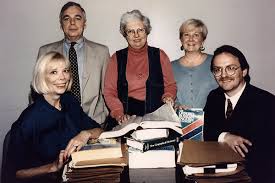Are Women Better Spycatchers?

Jeanne Vertefeuille (center) and her team.
Maureen Dowd’s most recent column profiled the sisterhood of analysts at the CIA. It got me wondering: are women better than men at the art of tracking down terrorists and catching spies? Here are three stories that point in that direction.
Story 1: Jeanne Vertefeuille and her team. Vertefeuille started her career at the CIA as a typist in 1954. She then worked her way up the ranks, serving as one of the agency’s first female station chiefs, among many other assignments. Along the way, she became an expert on counterintelligence and the Soviet Union. In the late 1980s and early 1990s, she led a team of five analysts – three women and two men – that unmasked Aldrich Ames, a CIA mole whom the New York Times describes as “one of the most notorious traitors in American history.”
Story 2: “Maya” and her cohorts – in the movie Zero Dark Thirty, Jessica Chastain plays Maya, the CIA analyst who locates Osama bin Laden’s hideout and prompts the mission that killed him. The movie character was fashioned on a real woman in the CIA. According to an article in the Washington Times, the real Maya worked with four other women – including Jennifer Matthews, who was killed in Khost, Afghanistan — to identify and target Al-Qaeda’s leaders. The group became known as the Band of Sisters.
Story 3: The current sisterhood at the CIA. Dowd’s column profiles Gina Bennett, Lyssa Asbill, Sandra Grimes (who worked with Vertefeuille), Kali Caldwell, Jennifer Matthews, and a covert officer named Meredith. Dowd paints a portrait of women who are smart, incredibly dedicated, and nothing at all like Hollywood depictions of female agents. They do, however, have a fondness for the superhero Elastigirl from The Incredibles. As Elastigirl says, “Leave the saving of the world to men? I don’t think so.”
Why might women be better at catching spies than men? When Vertefeuille was asked to help track down a mole, it was assumed that “women had been chosen for the unit because their bosses felt that women would have more patience in combing through records.”
In Dowd’s column, Gina Bennett explains that women think differently than men: “Women don’t think more intuitively than men, but we tend to trust our own gut less. We are not going to put all our money in one basket.”
Is it true that women are more patient than men? Or less likely to be led astray by their own gut feel? Perhaps. But I’m struck by the fact that each of these stories involves teams rather than individuals. A few weeks ago, I wrote an article suggesting that women add value to teams in two key ways:
- They make better decisions about risk, especially under stress. Spycatching is nothing if not stressful.
- Teams that include women are more collaborative, in part, because, women are better able “to read between the lines and understand what someone is really saying.” Understanding what a spy is really saying might well make the difference between success and failure.
In theory, women are better at handling stress, deciding about risk, and understanding what’s really going on. In practice, they’ve caught some of the most notorious spies in our history. Maybe we should just put them in charge.
We should tell High School guidance counselors to advise girls to become spies.
Very good idea.
Firsst of all, congratulations for your wedding anniversary…God bless you both and provides the best for you to reach the Golden one and even more. Keep going !!! We have just celebrated our 56th on April 21.
In regards to the question I should say they are,,,,don’t ever try to prove it whith your own sweetie.